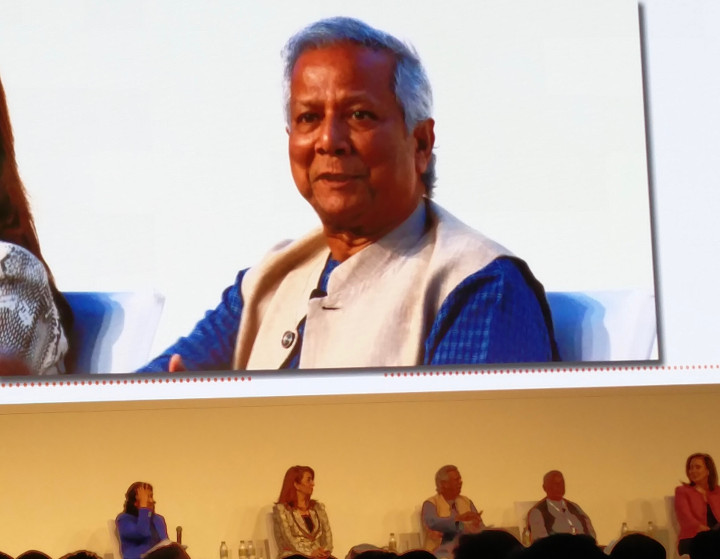Worldwide, Microcredit is associated with the name of charismatic Muhammad Yunus, 2006 Nobel Peace laureate together with Bangladesh’s Grameen Bank: “for their efforts to create economic and social development from below… Lasting peace cannot be achieved if large populations cannot find the way to escape the grip of poverty. Microcredit is one such way. The development from below also promotes democracy and human rights”.
The Grameen Bank has achieved astonishing figures in the first twelve years of its activity: nearly 3,000 delivery points with 27,000 employees across Bangladesh; loans averaging 200 US$ have benefitted 7.5 million customers in 80,000 villages, with a repayment rate close to 98%. The Grameen( meaning village in Bengali) model is replicated worldwide by public and private institutions.
Professor Yunus participated in most of the working sessions of this summit (18th Microcredit Summit, Abu Dhabi, U.A.E., March 14-17, 2016), oftentimes accepting being besieged by the participants even during intervals and afterwards. One asking for advice, someone wanting him to know about his or her organization, someone just to take a picture by his side…
Leopoldo Salmaso: Professor Yunus, now it all seems relatively easy, this Microcredit scheme, but how difficult was it to start off from scratch, especially in a poor country like Bangladesh?
Yunus: I keep saying that that was my luck, and I really believe it. If there are no obstacles, there is no stimulation to overcome them. I also say to young people today; look for challenges! Today’s young people have an incredible tool, telematic technology [branch of information technology which deals with the long-distance transmission of computerized information]. They can feel content in the leisure pursuits that it offers… or they can use it to explore a bigger world until recently unimaginable, especially in the field of microcredit. Even the virtual scenarios, with today’s technology, are a great opportunity. Because they allow you to imagine something that does not exist; and if there was no imagination like that there would be no creation of new things. Therefore I repeat to young people; look for challenges, and dream about how to overcome them!
Leopoldo Salmaso: Professor, you have repeated on several occasions that in the universe of Microcredit there is room for either pure ‘welfarist’ activities and for-profit enterprises. But the coexistence of actors with so different motivations, does it not create conflict, or at least confusion?
Yunus: The conflict is part of life, and I reiterate that the challenges are opportunities more than obstacles. The only thing that truly one owes to himself and to others is clarity. Want to make Microcredit for pure social inclusion? Welcome! Want to do Microcredit for your personal profit? Welcome! Want to do half and half, or a mix in any proportion? Welcome!
Leopoldo Salmaso: And what is your personal choice? Don’t you feel uncomfortable to be here today in this luxurious setting while thinking of the poor people who will return to besiege you tomorrow in a remote village?
Yunus: My choice was and remains to work from below. But today I am happy and grateful to be here, together with all these wonderful people who share my same goal and who declare clearly how they intend to pursue it.
Leopoldo Salmaso: You certainly deserved the Nobel Prize for Peace, but in the first instance your innovation belongs to economics: did they assign you to the wrong prize category?
Yunus: (lighting up in a knowing smile) Well, this question should be asked of them!
Leopoldo Salmaso: Well yes, but “they” – those who award the Nobel Prize for Economics – they are not the same ones who award the Nobel Prize for Peace.
Yunus: True, “they” are those of the Bank of Sweden …
Leopoldo Salmaso: The establishment of the Nobel Prize for Economics took place seventy years after Nobel. The committee dared assigning a number of “their” awards to non-orthodox economists, provided their criticism was restricted to purely theoretical grounds. So I ask: couldn’t they assign it to you, as you have put into place a practical economic revolution of historic proportions?
Yunus: (with that same smile on his face) An intriguing question… Also to be asked of them!
Leopoldo Salmaso: OK, let’s leave them alone and go back to you. As a banker you gave credit to the poor, and as a Muslim male you gave credit to the women, then you are a double revolutionary?
Yunus: I am one who likes challenges. The challenge I faced was actually a double and great one, but it was enough to pick it up and the way for its solution became obvious and workable.
Leopoldo Salmaso: You continue to be modest. The poor and the women are still the biggest victims of violence on earth. So you are a global nonviolent revolutionary.
Yunus: Thank you. But then, if nonviolence is the main road to peace, you too will have to admit that, perhaps, they did not award me the wrong Nobel!






